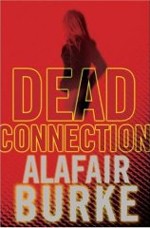 Never Tell
Never Tell
by Alafair Burke
Series: Ellie Hatcher, #4
Hardcover, 348 pg.
HarperCollins Publishers, 2012
Read: November 9 – 10, 2015

Ellie Hatcher and her partner, Rogan are called to a very nice townhouse to start investigating a homicide. At least that’s how it was called in. As far as the EMTs, the police officers that were first on the scene, and Ellie’s instincts are concerned, it was a suicide. But the distraught mother has money and is married to a music producer of some note, so when they squawk “murder”, Rogan and Hatcher at least have to spend some time considering it one.
There are a number of little signs all along that point to homicide, but suicide is obvious, easy, and quick to handle. Even as evidence starts to pile up, Ellie resists seeing suicide. The greater part of this is written as her coming to grips with her father’s all those years ago. I didn’t buy that explanation, really — I couldn’t see why Ellie hadn’t jumped in with gusto, just in case. That seems more consistent with her character than this cynical cop we see here.
There’s another story here — somewhat tied to the other, but you’re never sure just how much it’s tied together until the end. A woman who was repeatedly raped by her mother’s boyfriend a decade or so ago, is seeking healing, seeking to tell her story. So she starts an anonymous blog, “Second Acts: Confessions of a Former Victim and Current Survivor.” But she starts receiving threats, threats that demand to be taken seriously (but not enough to involve the police until she’s forced to) — which just empower her to continue. At a certain point, the threats become more personal, and maybe the anonymity isn’t as strong as the blogger thought. You’d think following 212 that Hatcher and Rogan would be more willing to believe the level of violence threatened here, but they don’t seem to take it seriously until forced to either (although, once this lands on their radar, they handle it better than the suicide/homicide).
I liked — as characters, not necessarily as people — the mourning mother and most of the social circle of the dead girl, and the lady who runs the homeless shelter. But everyone else pretty much left me cold. Jess had so little to do this time, it’s a wonder Burke used him at all. The Max storyline was okay, but seemed a little pat and tired — especially in the way that Ellie and Max reacted to each other. I’m not looking for much out of that part of the series, but I’d like something interesting. Nothing Rogan did really caught my attention, he served as an okay foil for Ellie/someone to spur her on, but it really could have been any other character doing the same. Thankfully, the stories were strong enough to keep me invested.
In the end, this is a solid mystery, with plenty of red herrings and half-told-truths to keep the reader and the detectives questioning what they see in front of them. Ellie Hatcher continues to be a character worth spending time with — even when she’s wrong.
—–







